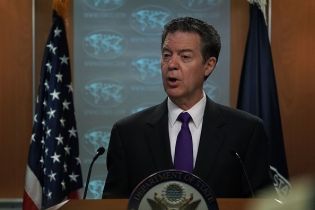Religious Freedom Envoy: China One of the ‘Worst Human Rights Situations in the World’, by Patrick Goodenough

Inspiring ‘Unbroken’ Sequel Shows WWII Hero Overcoming “Darkest Days”, by Josh Shepherd
December 12, 2018
Archbishop Gomez: Church Needs to ‘Return to Guadalupe’
December 12, 2018
Chinese riot police in the Xinjiang region, home to the Uighur Muslims. (Screen capture: YouTube, File)
By Patrick Goodenough, CNSNews, December 12, 2018
(CNSNews.com) – The administration’s ambassador-at-large for international religious freedom painted a bleak picture Tuesday of the landscape in China, and called the communist regime’s suppression of Uighur Muslims one of the “worst human rights situations in the world.”
“China isn’t backing away from the religious persecution; it seems to be expanding,” Ambassador Sam Brownback said, pointing also to Beijing’s treatment of Christians and other minorities.
“This is obviously very troubling to the administration.”
Briefing reporters on the State Department’s new religious freedom blacklist designations, Brownback also said the situation in Russia has deteriorated in the past two years, with a wide range of Christian denominations targeted.
Earlier, Secretary of State Mike Pompeo announced he has designated ten “countries of particular concern” (CPCs) for engaging in or tolerating severe violations of religious freedom.
They are Burma, China, Eritrea, Iran, North Korea, Pakistan, Sudan, Saudi Arabia, Tajikistan and Turkmenistan.
Pakistan is a newcomer to the blacklist – after 16 years of being allowed to evade the designation – and the only other change from last year’s CPC list is the removal of Uzbekistan.
Uzbekistan, which had been a CPC since 2006, has been moved to a second-tier “special watch list,” where it joins Russia and the Comoros.
Pompeo also named the Taliban, al-Qaeda, al-Qaeda in the Arabian peninsula, al-Qaeda’s Somali affiliate Al-Shabaab, the al-Nusra Front in Syria, Boko Haram in Nigeria, the Shi’ite Houthis in Yemen, ISIS, and the ISIS Afghanistan-Pakistan affiliate known as ISIS-Khorasan, as “entities of particular concern.”
CPC designation takes place under the International Religious Freedom Act (IRFA), a 1998 law that also established the ambassador-at-large post and created the U.S. Commission on International Religious Freedom (USCIRF), an independent statutory body that advises the executive and legislative branches.
USCIRF Chairman Tenzin Dorjee said Tuesday the CPC designations “demonstrates America’s strong and active support for freedom of religion and belief worldwide.”
As has invariably been the case, the USCIRF’s own list of countries which it believes deserve CPC designation overlaps, but does not mirror, the State Department’s actual designations.
This year, the USCIRF recommendations include all ten of the countries that were named by Pompeo on Tuesday, but also the Central African Republic, Nigeria, Russia, Syria, Uzbekistan, and Vietnam.
Dorjee said the USCIRF questioned whether Uzbekistan has “sufficiently improved” to be downgraded from CPC to “watch list” status.
Brownback asserted that Uzbekistan has “made substantial changes,” however.
“And they’re doing it because they want to grow their nation,” he said. “They want to see less terrorism, and they see this as a key route to really improving the livelihood of people throughout their nation.”
Broadly, Brownback said countries that respect religious freedom tend to have less terrorism long-term and more economic growth.
“A freer society is one less prone and moved and pushed really towards terrorism, and one more open to economic reform.”
China’s handling of its Uighur Muslim minority in the country’s far west has drawn growing concern worldwide. A senior State Department told lawmakers recently that anywhere from 800,000 to two million Uighurs have been incarcerated in internment camps over the past 20 months.
“This is one of the, just really, worst human rights situations in the world, what’s happening to the Uighurs,” Brownback said.
He added that Tibetan Buddhists and Falun Gong adherents were also being persecuted, along with Christians. He cited the reported detention this week of dozens of churchgoers and seminary students at a Protestant congregation that does not submit to the state’s “patriotic” church organization.
‘Change this trajectory’
Brownback said Russia’s “watch list” placement amounts to a warning that if it does not “change this trajectory” it risks CPC designation.
He said Russia’s violations, following passage of a 2016 law criminalizing illegal missionary activity, included the targeting of groups such as the Salvation Army, Pentecostals, Jehovah’s Witnesses, Baptists, Lutherans, Mormons and the Ukrainian Reformed Orthodox Church.

China’s national flag flies over a mosque closed by authorities in Kashgar, in China’s far-western Xinjiang province, home to the Uighur Muslims. (Photo by Kevin Frayer/Getty Images)




